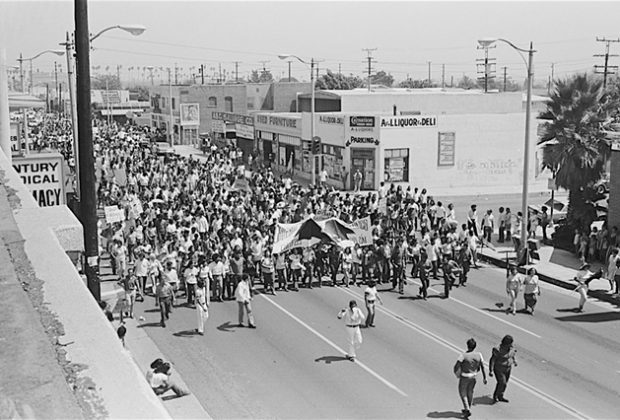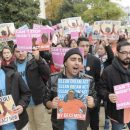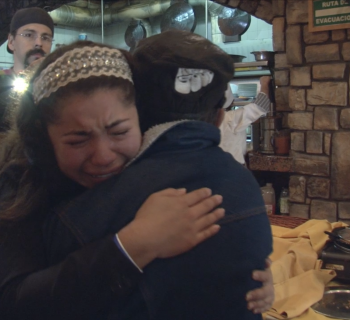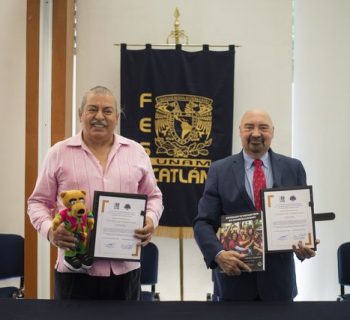––> Read full newsletter here: https://mailchi.mp/d668b39cea2a/historic-50th-anniversary-chicano-moratorium-celebration-and-new-dacas-advance-parole-criteria
All Winter 2020 California-Mexico Dreamers Study Abroad Program participants have applied for DACA’s Advance Parole on August 31, 2020
As of August 31, 2020, the California-Mexico Studies Center (CMSC) is pleased to announce that we have assisted 87 Dreamers to apply for DACA’s Advance Parole travel authorization, in order to participate in our Winter 2020 California-Mexico Dreamers Study Abroad Program, which involves a comprehensive 4-week travel-study experience in Mexico from December 15, 2020 to January 19, 2021.
Given a new guidance by the U.S. Department of Homeland Security (DHS) on revised criteria for DACA’s Advance Parole eligibility, the program will provide an exceptional opportunity for participating students to explore and research various topics pertaining to U.S.-Mexico national security interests, consistent with the USCIS Policy Memorandum from Deputy Director for Policy Joseph Edlow, and the updated criteria for DACA Advance Parole published on August 21, 2020 (https://www.uscis.gov/i-131).
Thus, our study abroad program will focus upon the new U.S.-Mexico-Canada Agreement (USMCA), it will allow students to conduct independent family ethnographic research, as well as it will provide the opportunity to publish their research in a compendium of academic policy papers on migration, border security, the COVID-19 pandemic and topics related to the important economic regional interdependence to be researched by the program participants.
This program model builds upon 6 previous programs led by Professor Armando Vazquez-Ramos from 2014 to 2017, which allowed 160 DACA-recipients with a similar travel-study opportunity. In addition, the CMSC’s Winter 2020 program will provide the 87 Dreamers with an academic and field study experience on the cultural lifestyle and educational system, the health and social institutions of Mexico, and enhance their language skills through a full-immersion study abroad experience.
However, given the possibility that the program may be postponed due to the pandemic, our participants have asked USCIS travel authorization approval for 9 months (275 days) from December 1, 2020 to August 31, 2021. This will allow the CMSC to reschedule the program to the Summer of 2021, and for participants to travel with the same Advance Parole permit.
The participants will be immersed into a comprehensive language and cultural educational program hosted by the Centro Internacional de Lenguas, Arte y Cultura Paulo Freire (CILAC Freire Institute), consisting of historical, cultural, linguistic, and academic lectures on the Mexican educational, health, economic and political systems, visit various museum and archeological sites, and provide a home-stay living experience with Mexican host families. The academic program is organized by the CMSC and Mexico’s graduate school Colegio de la Frontera Norte where the program will conclude on January 19, 2021.
The course is highly rigorous and will require students to produce a 10-page U.S.-Mexico National Security research paper, based on the travel-study experience of the participants, and the personal experience from the trip. The CMSC will also produce a documentary on the trip and publish the policy papers produced by student participants.
–––––––––––––––––––––––––––––––––––––––––––––––––––––––––––––
New DHS memorandum announces the implementation of new DACA guidelines
By: Alisa Reznick, Arizona Public Media – Aug. 24, 2020
U.S. Citizenship and Immigration Services (USCIS) is enacting broad changes to the Deferred Action for Childhood Arrivals program, or DACA, the Obama-era program that gave some 800,000 immigrants brought to the U.S. as children temporary protection from deportation and a work permit. In a memo dated Aug. 21 and released Aug. 24, the agency announces the official implementation of a set of changes introduced in July in a memo from Acting Department of Homeland Security Secretary Chad Wolf... Read Full Article
–––––––––––––––––––––––––––––––––––––––––––––––––––––––––––––
VER PROGRAMA | REGÍSTRATE AQUÍ
–––––––––––––––––––––––––––––––––––––––––––––––––––––––––––––
California to require ethnic studies to graduate high school under bill headed to Gov. Newsom
By: JOHN FENSTERWALD, EdSource – Sep. 1, 2020
California would become the first state to require that all high school students pass a one-semester ethnic studies course to graduate if Gov. Gavin Newsom signs a bill that the Legislature passed on Monday, the last day of the legislative session. But in order to get Assembly Bill 331 out of a Senate committee and on to a final vote, the primary author, Assemblyman Jose Medina, D-Riverside, proposed one amendment and accepted several others
One amendment would push back the start date to the graduating class of 2029-30; districts would have to begin offering a course in the 2025-26 school year.... Read Full Article
–––––––––––––––––––––––––––––––––––––––––––––––––––––––––––––
CMSC Dreamers will help with food distribution
VOLUNTEER OPPORTUNITY ON LABOR DAY:
Food Distribution Drive in Wilmington, CA
September 7, 2020
Volunteers are needed on Monday, September 7, 2020 for the South County Labor's massive drive-up food distribution at Banning Park (401 East M St., Wilmington, CA 90744).
Labor Community Services and the Los Angeles Regional Food Bank will coordinate this food distribution with the support of Supervisors Hahn and Solis, and the Council Office of Joe Busciano. The goal is to distribute food to over 2,500 families.
A Volunteers Lunch (hot dogs and hamburger) will be provided by IBEW Local 11 and the food cost will be hosted by the Harbor Labor Day Committee.
For more information, click here.
To sign up, fill out this Google Form
–––––––––––––––––––––––––––––––––––––––––––––––––––––––––––––
The Census is in trouble, and so is democracy
By THE TIMES EDITORIAL BOARD, Los Angeles Times – AUG. 31, 2020
If the 2020 census isn’t in a state of crisis, it is awfully close. The coronavirus pandemic, of course, has made pretty much everything about contemporary life in America a lot more difficult. But the problems confronting the 2020 census also have a significant political component, from the Trump administration’s effort to scare off immigrant participation by adding a question about citizenship status, through the recent order to speed up the conclusion of the count — even though the agency had asked Congress in April to extend its reporting deadline because of pandemic-related... Read Full Article
–––––––––––––––––––––––––––––––––––––––––––––––––––––––––––––
Half a century after the death of Rubén Salazar by the Police, the controversy survives
California State University Long Beach MEChA Delegation at the 1970 National Chicano Moratorium
Photo: La Raza Magazine Photo Collection / UCLA Chicano Studies Resource Center
By: EFE News, Los Angeles, August 28, 2020
The memory and legacy of Mexican journalist Rubén Salazar are still alive 50 years after his death at the hands of Los Angeles sheriffs, a death that still raises doubts and accentuates the controversy over police brutality against minorities in the United States.
Salazar died on August 29, 1970 by a tear gas projectile fired by an officer of the Los Angeles Sheriff’s Department (LASD) when he was inside a bar in the East of the city... Read Full Article
–––––––––––––––––––––––––––––––––––––––––––––––––––––––––––––
LATEST NEWS:
–––––––––––––––––––––––––––––––––––––––––––––––––––––––––––––
- Key Findings About U.S. Immigrants (Pew Research Center)
- Medio siglo de la muerte de Rubén Salazar por la Policía, la polémica pervive (EFE News)
- Hundreds converge on East LA for 50th Anniversary of Chicano Moratorium
- Cuando los mexicoamericanos se transformaron en chicanos: Recuerdos de la moratoria Chicana en el Este de Los Ángeles hace 50 años (Los Angeles Times)
- Mexican American Vietnam War vets recall the Chicano Moratorium (Los Angeles Times)
- A nation of immigrants no more (VOX)
- Vacuna de Cuba contra COVID-19 comienza pruebas en humanos (BBC News Mundo)
- More than 300 faith leaders call on Trump, Republican delegates to change immigration policies (Religious News)
- Fueron deportados, los unió el activismo y hoy se casaron en Tijuana (SD Union Tribune)
- Activistas buscan detener restricciones de DACA por Trump (La Opinión)
––> Read full newsletter here: https://mailchi.mp/d668b39cea2a/historic-50th-anniversary-chicano-moratorium-celebration-and-new-dacas-advance-parole-criteria













